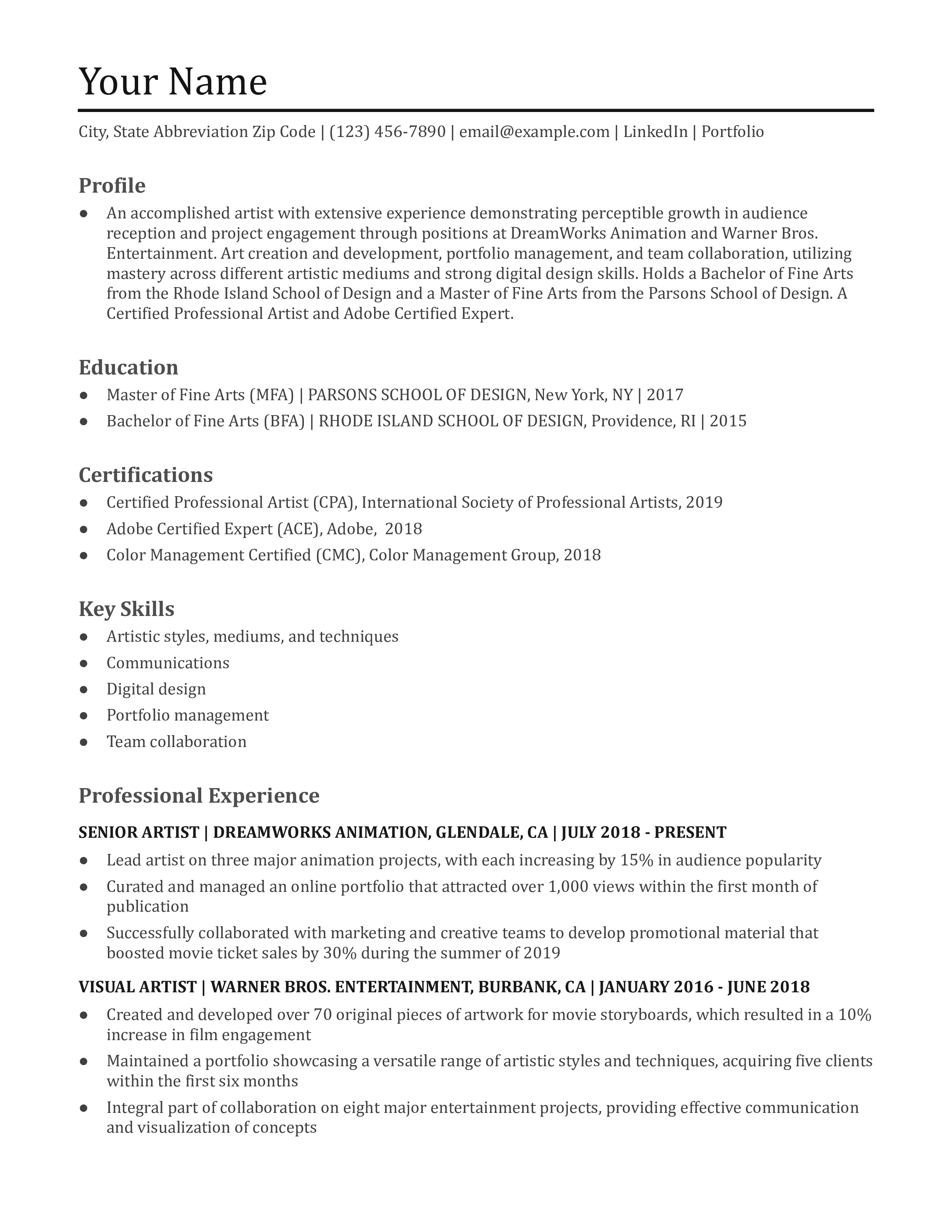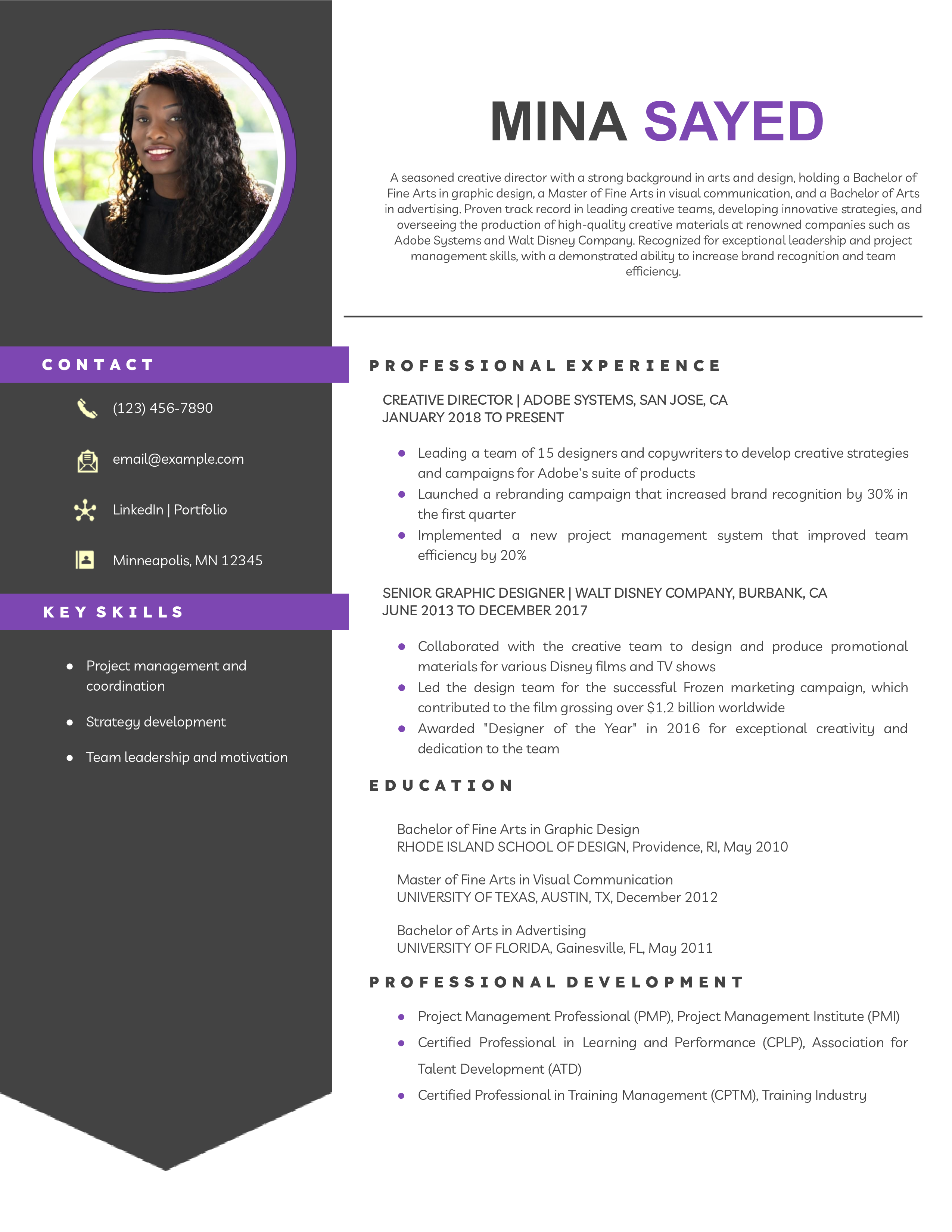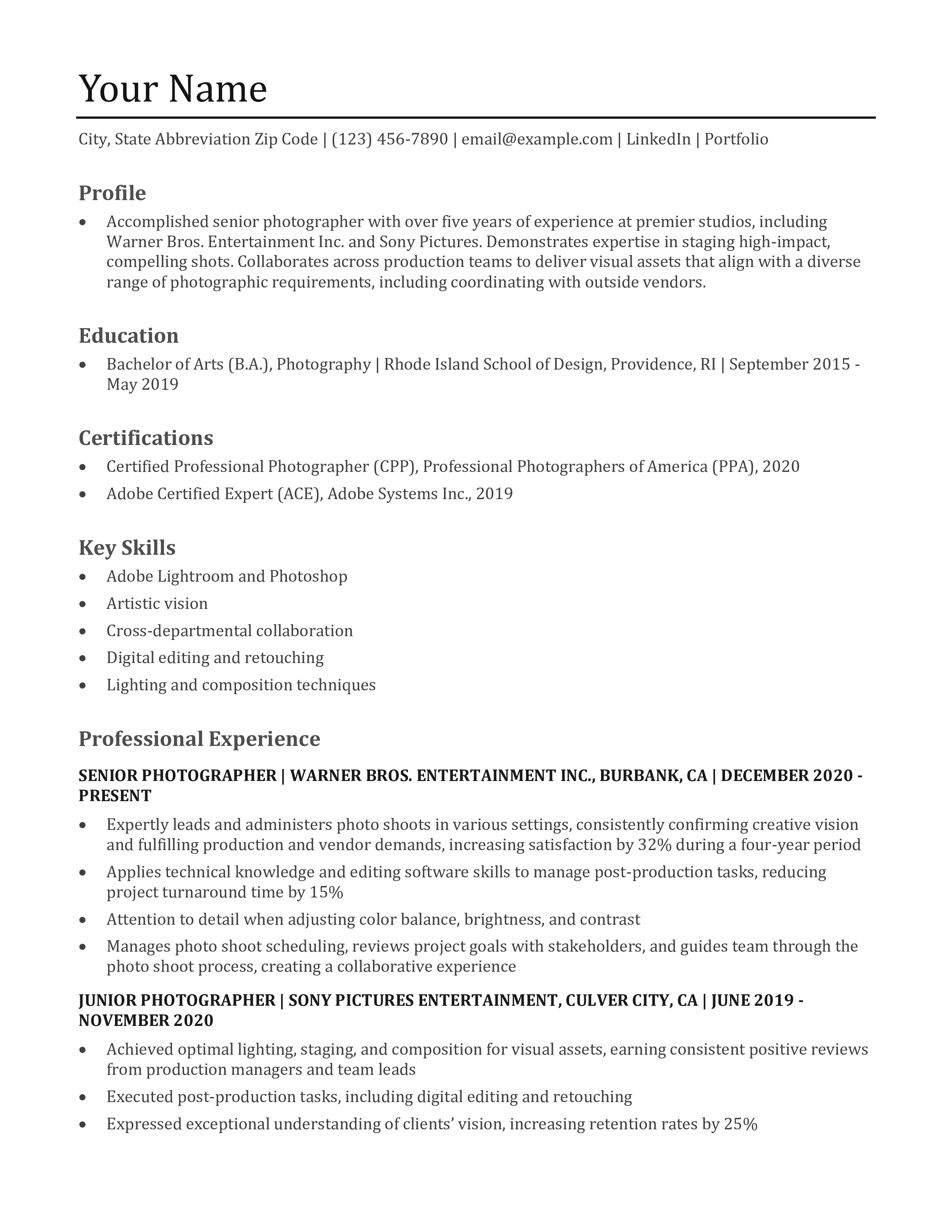Your acting resume should leave casting directors eager to see you come in for an audition. It must convey your versatility, theatrical talent, and commitment to honing your craft. We’ll provide tips and strategies to help you create a resume that shines a spotlight on the show-stopping moments of your acting career.
Key takeaways:
- Highlight acting expertise: Start strong with a resume summary showcasing your acting range and specializations to immediately grab the attention of casting teams.
- Detail notable performances: When listing your previous roles, select the most recent and relevant productions, especially those in which you earned an award or recognition.
- Include ATS-friendly keywords: Applicant tracking systems (ATS) search applications for keywords mentioned in casting calls and job postings, so include a few in your resume.
Acting Resume Examples and Templates (Downloadable)
Entry-Level Acting Resume Example
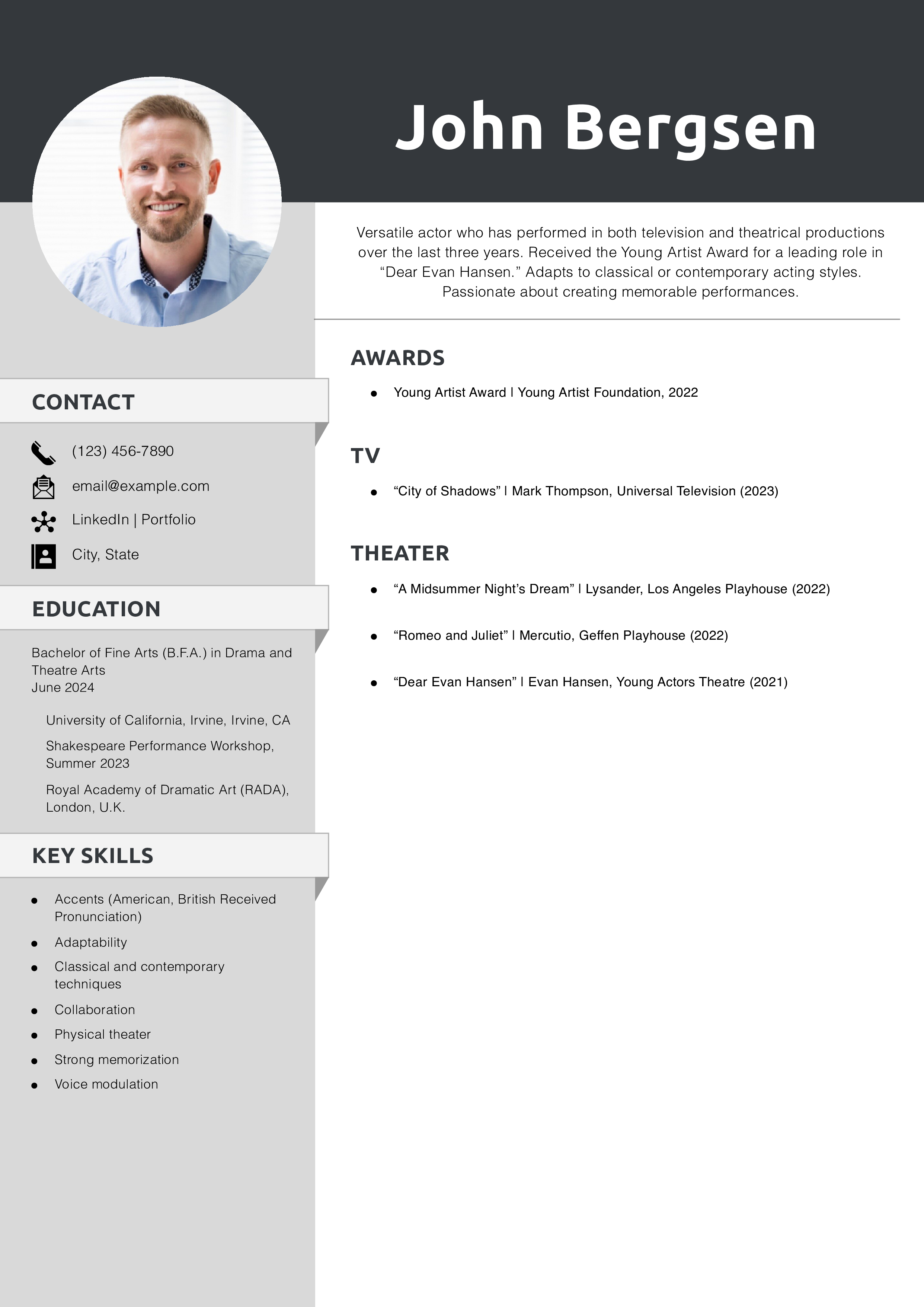
Why this Entry-level Acting Resume is Strong:
This resume example demonstrates the most impressive aspects of the candidate’s acting experience during the early phases of their career. The document effectively captures their awards, notable performances, and workshops, which helps broaden their appeal with casting directors.
Mid-Level Actress Resume Example
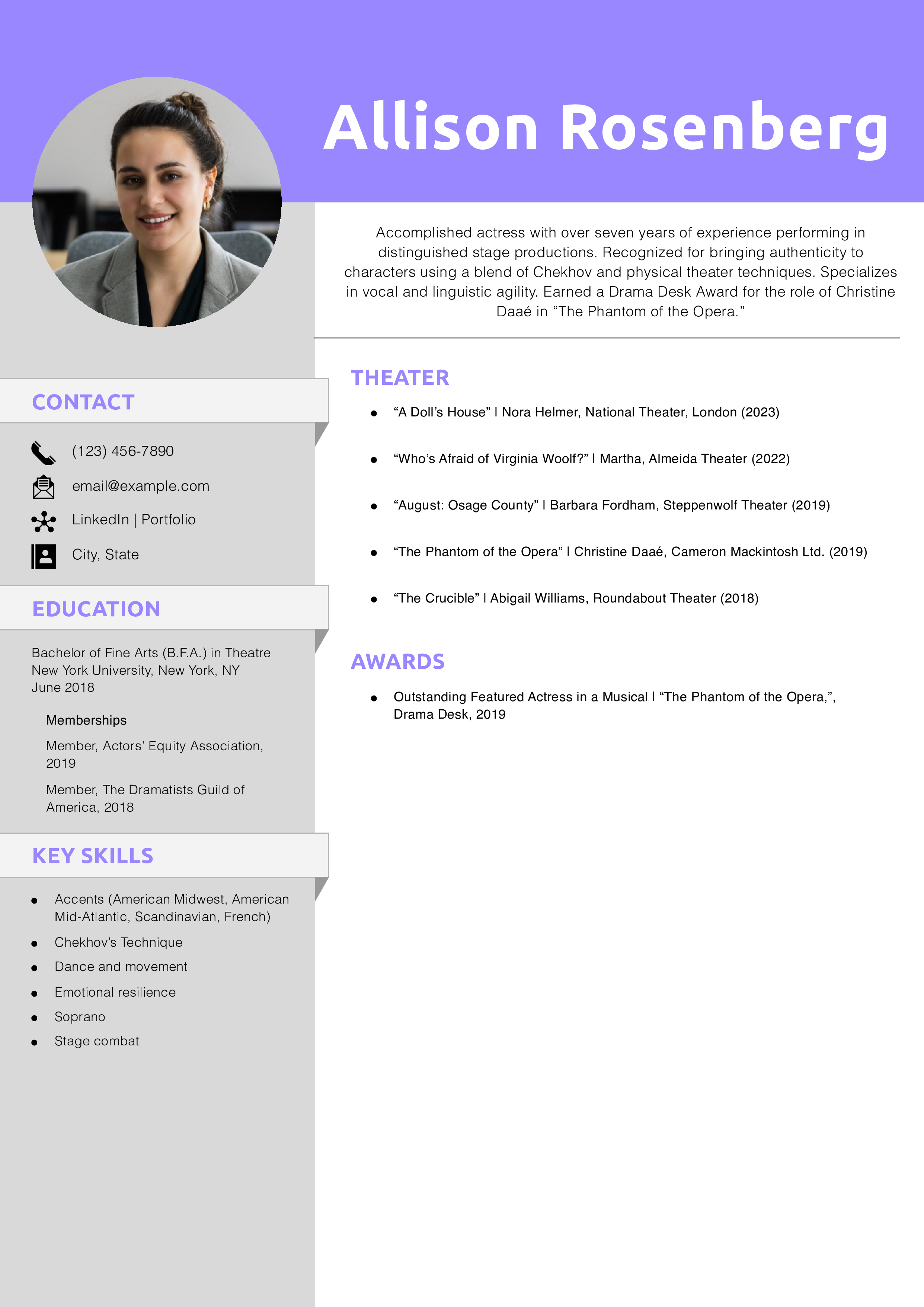
Why this Actress Resume is Strong:
This resume example effectively illustrates the candidate’s unique talents as an actress with an engaging summary and a clean layout. The document provides a compelling overview of their most impressive performances and awards, which will grab casting directors’ attention.
Experienced Acting Resume Example
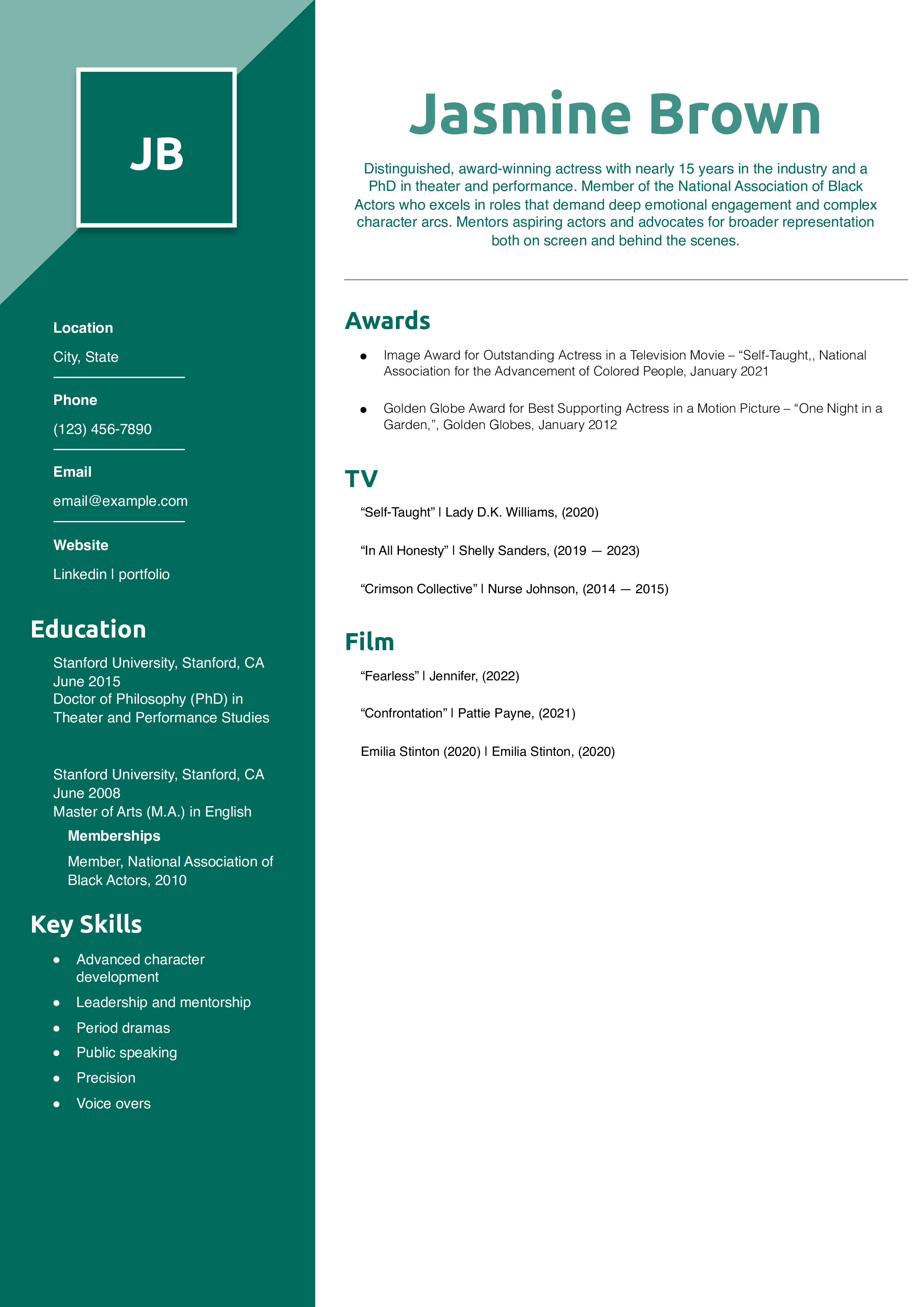
Why this Acting Resume is Strong:
This resume example captures the candidate’s dynamic experience as a professional actress. The document showcases their background delivering award-winning performances in film and television productions, which will set them apart from other candidates.
Voice Acting Resume Example
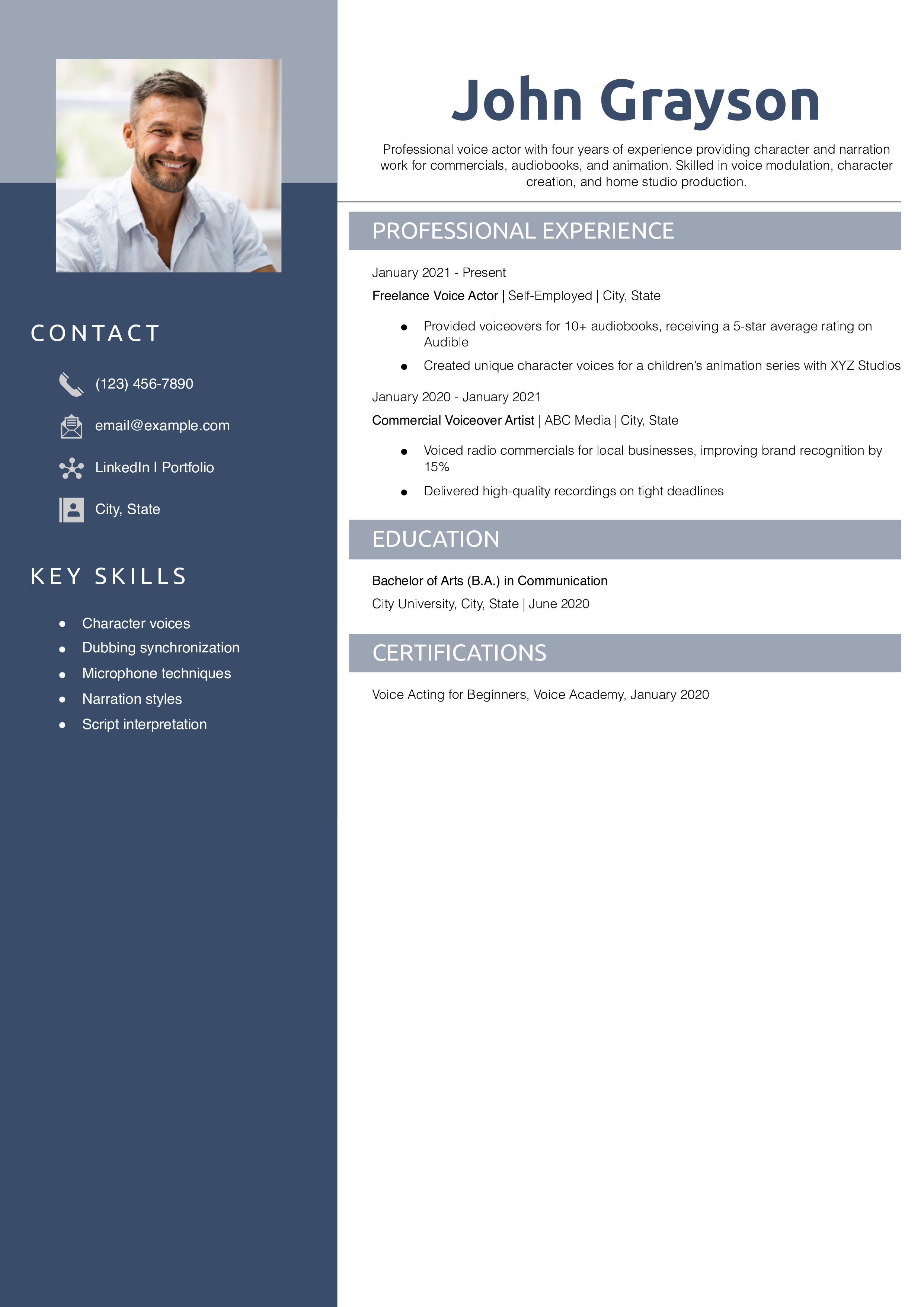
Why this Voice Acting Resume is Strong:
This voice-acting resume showcases versatility with a mix of audiobook, animation, and commercial work. Highlighting professional training adds credibility. Learn how to refine your skills here.
Commercial Acting Resume Example
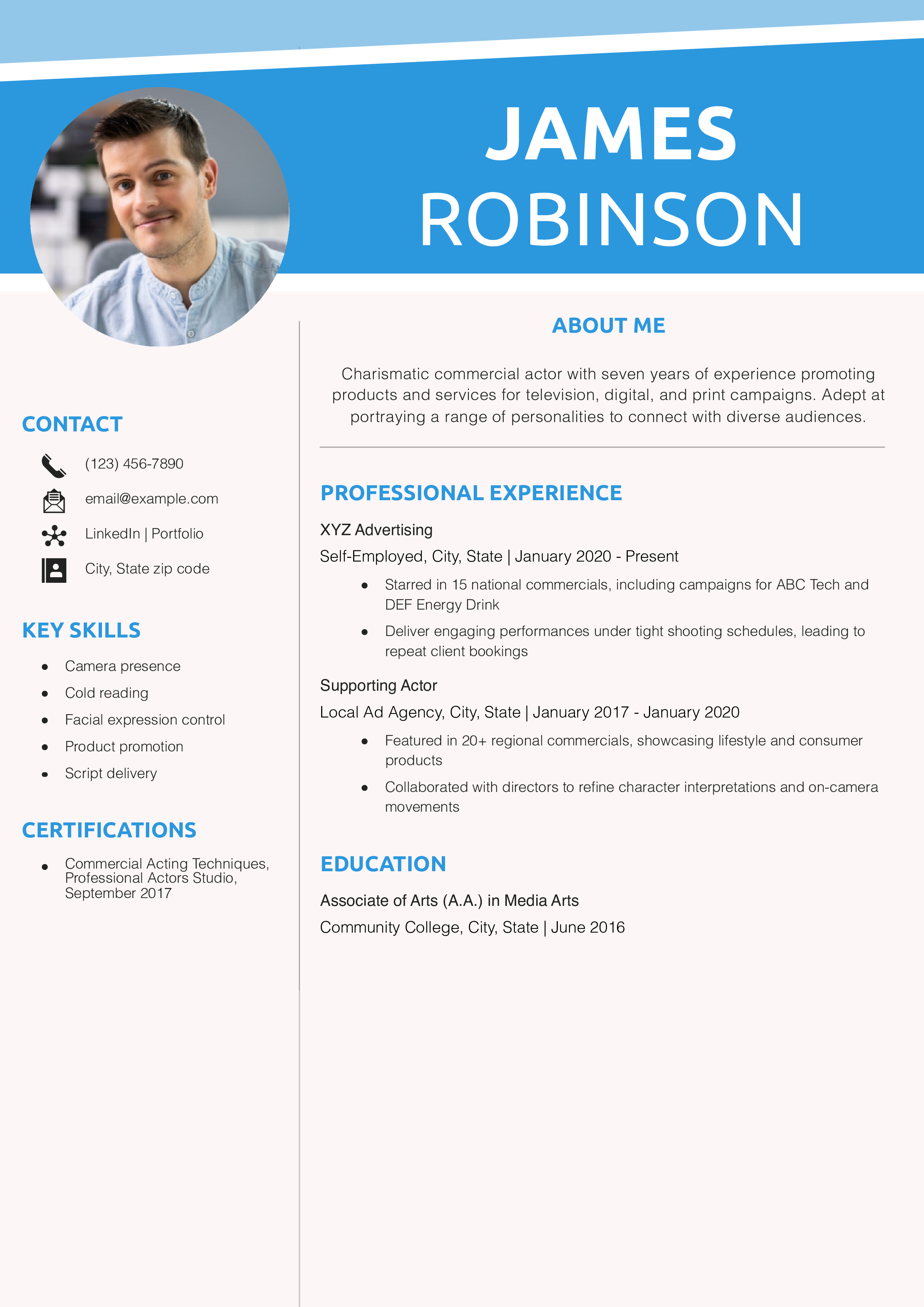
Why This Commercial Actor Resume Is Strong:
This commercial acting resume effectively highlights on-camera experience and the candidate’s ability to adapt to diverse roles. The inclusion of specific campaign mentions enhances credibility. Learn more about how to create a dynamic resume summary here.
Teen Acting Resume for Teenagers
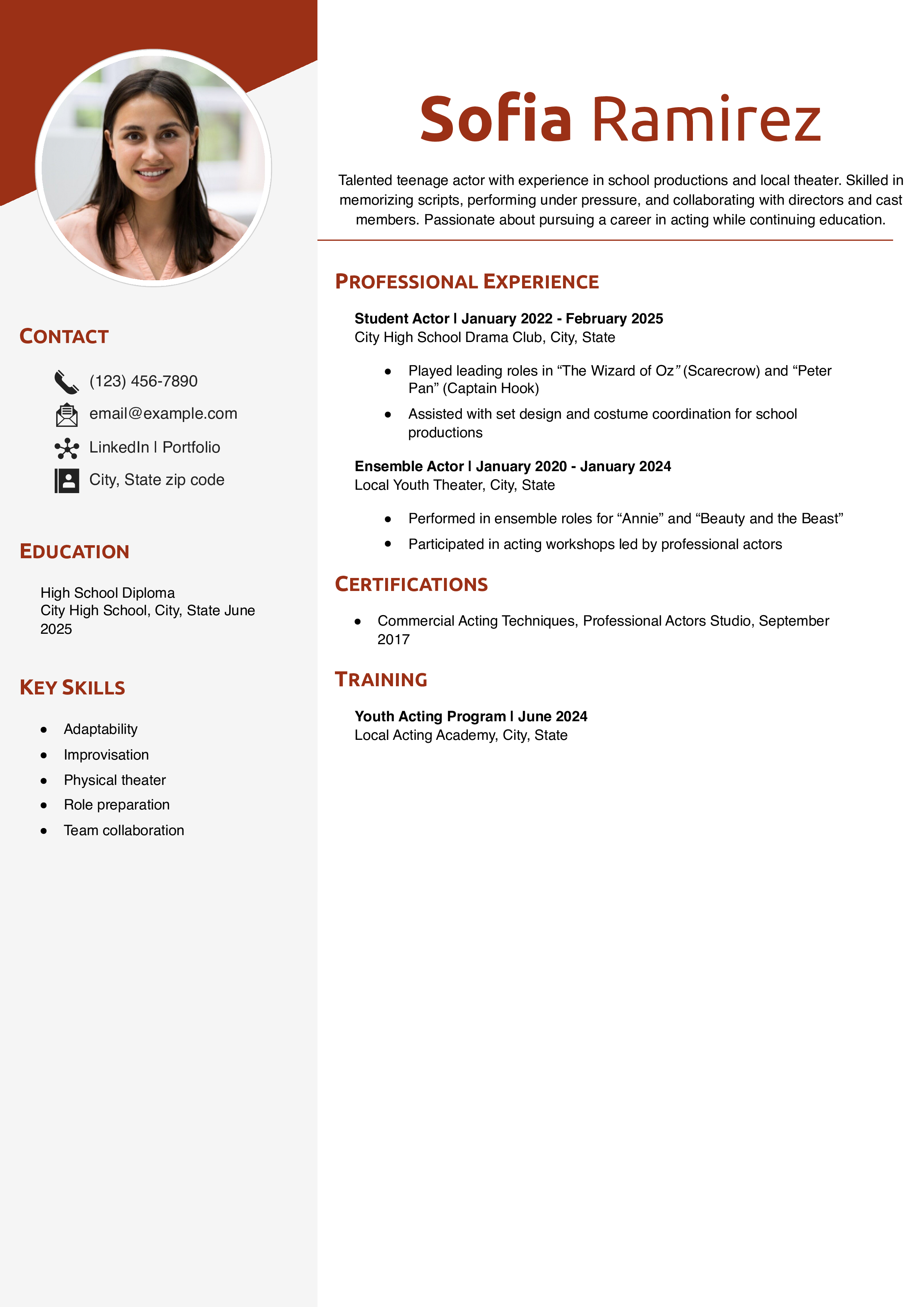
Why this Acting Resume is Strong:
This resume highlights key achievements and roles suitable for a young actor. It focuses on relevant skills and training, showing a clear commitment to the craft. Learn how to build yours here.
Stage Actor Resume Example
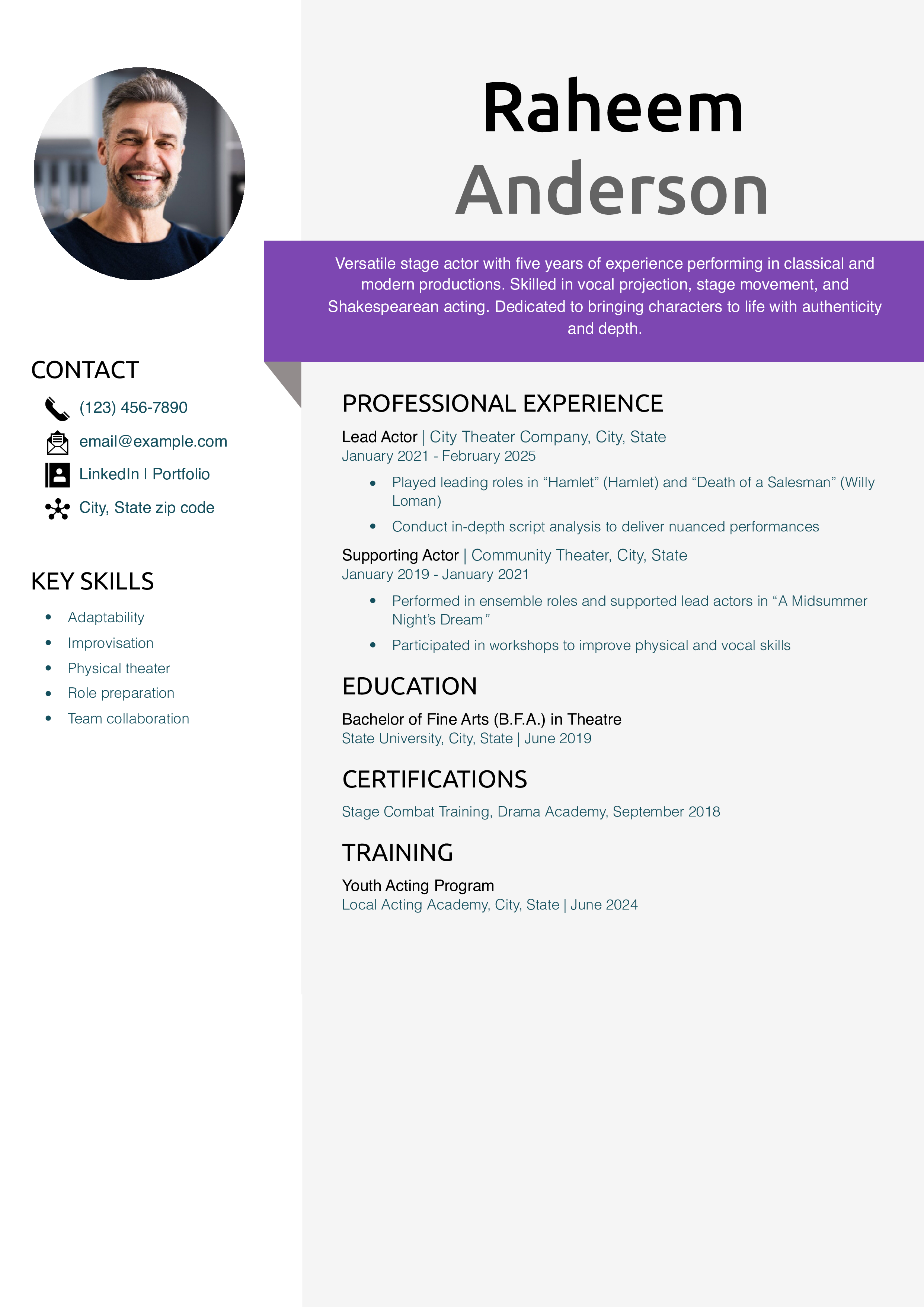
Why this Stage Actor Resume is Strong:
This stage actor resume emphasizes diverse experience in lead and supporting roles. It highlights classical training and performance versatility. Learn how to structure your resume here.
Film Acting Resume Example
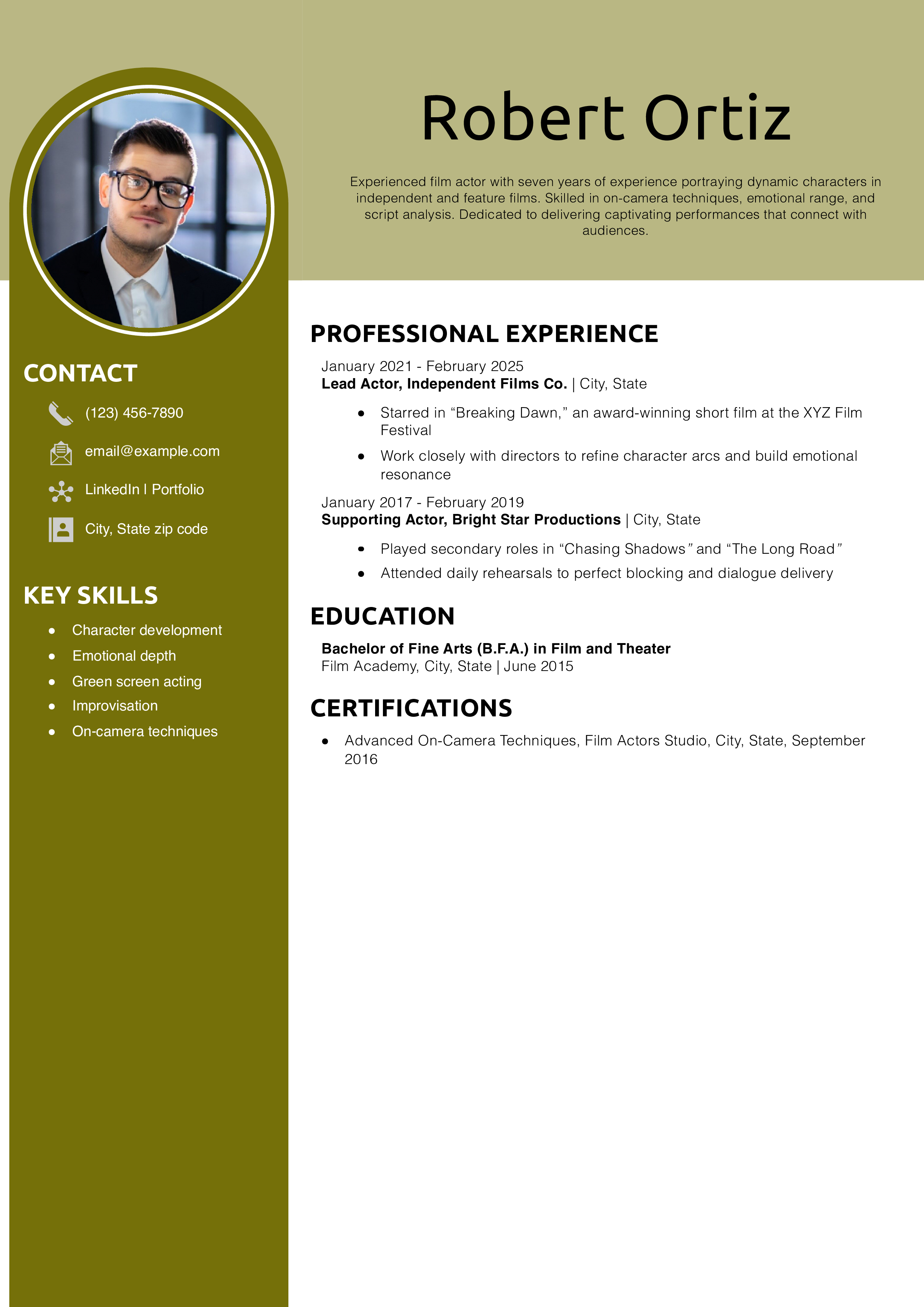
Why this Film Acting Resume is Strong:
This film acting resume emphasizes on-camera skills and a mix of leading and supporting roles. It highlights festival recognition, adding credibility to the actor’s experience. Learn how to build yours here.
Comedy Acting Resume Example
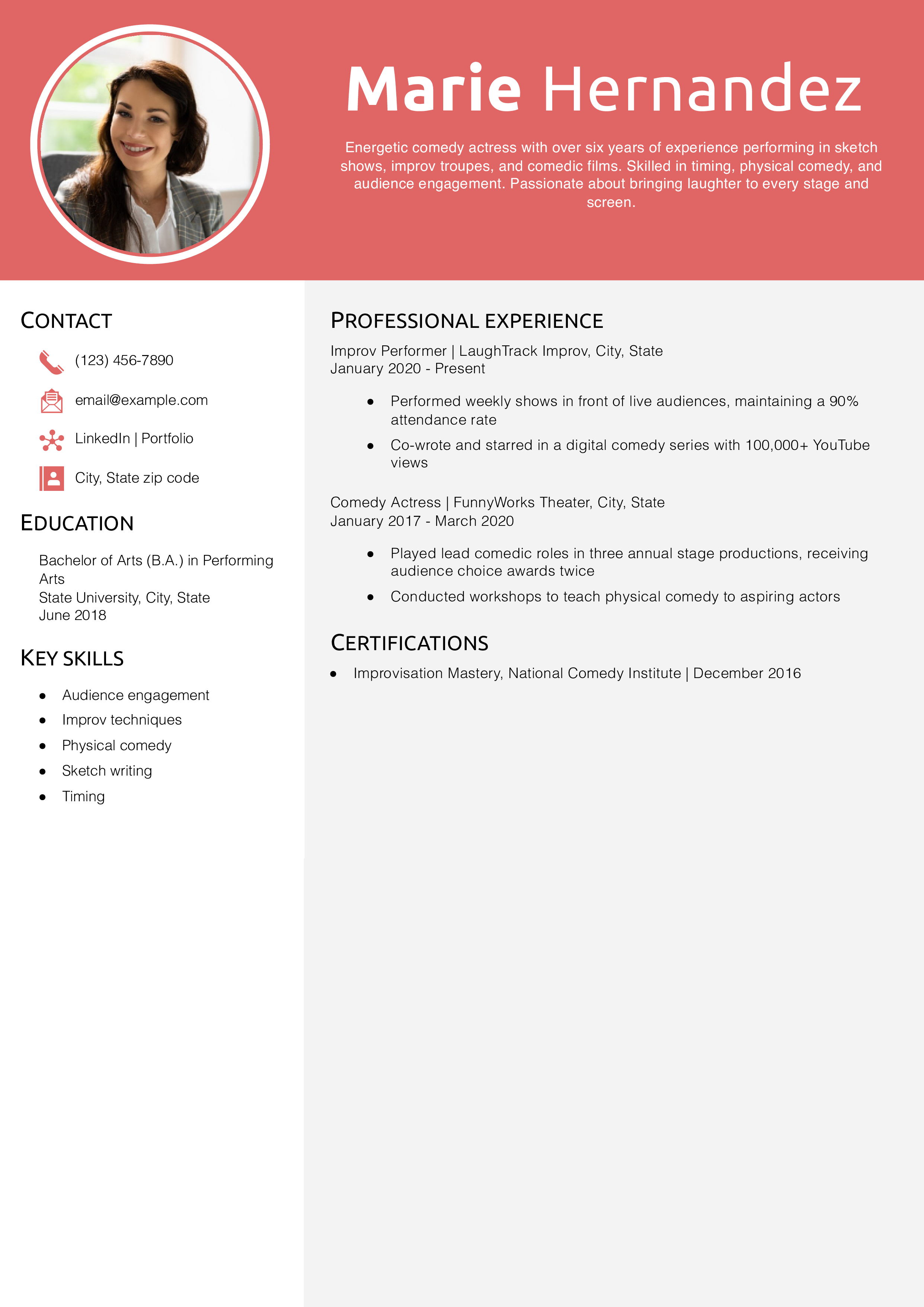
Why this Comedy Acting Resume is Strong:
This comedy acting resume focuses on specialized skills like improv and sketch writing. Highlighting audience response and digital engagement demonstrates versatility. Learn more about building a professional resume here.
Theater Acting Resume Example
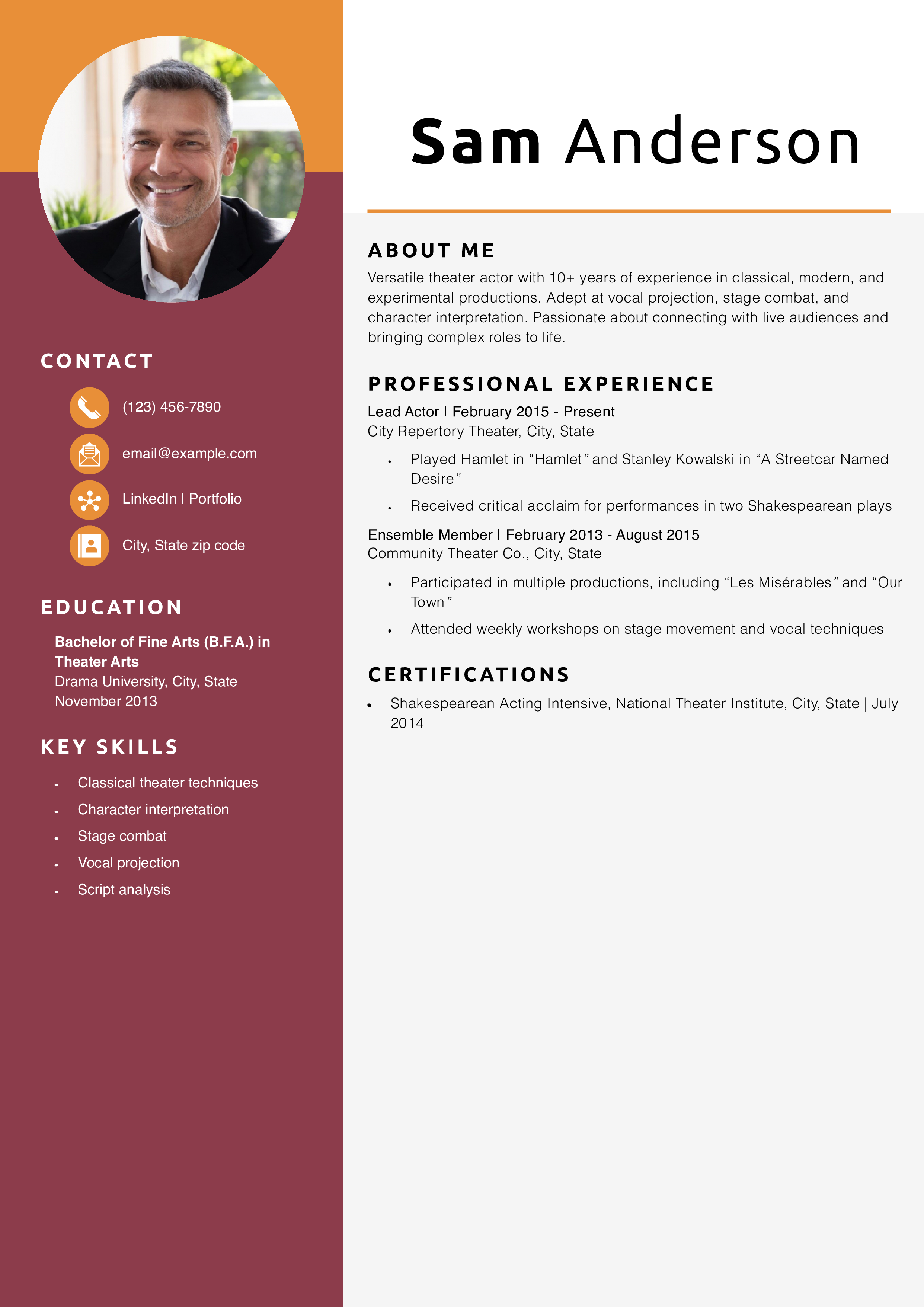
Why this Theater Acting Resume is Strong:
This theater acting resume highlights a range of roles and formal training in classical acting. Specific roles and critical acclaim add credibility. Learn more about how to craft an accomplishment-driven resume here.
Background Actor Resume Example
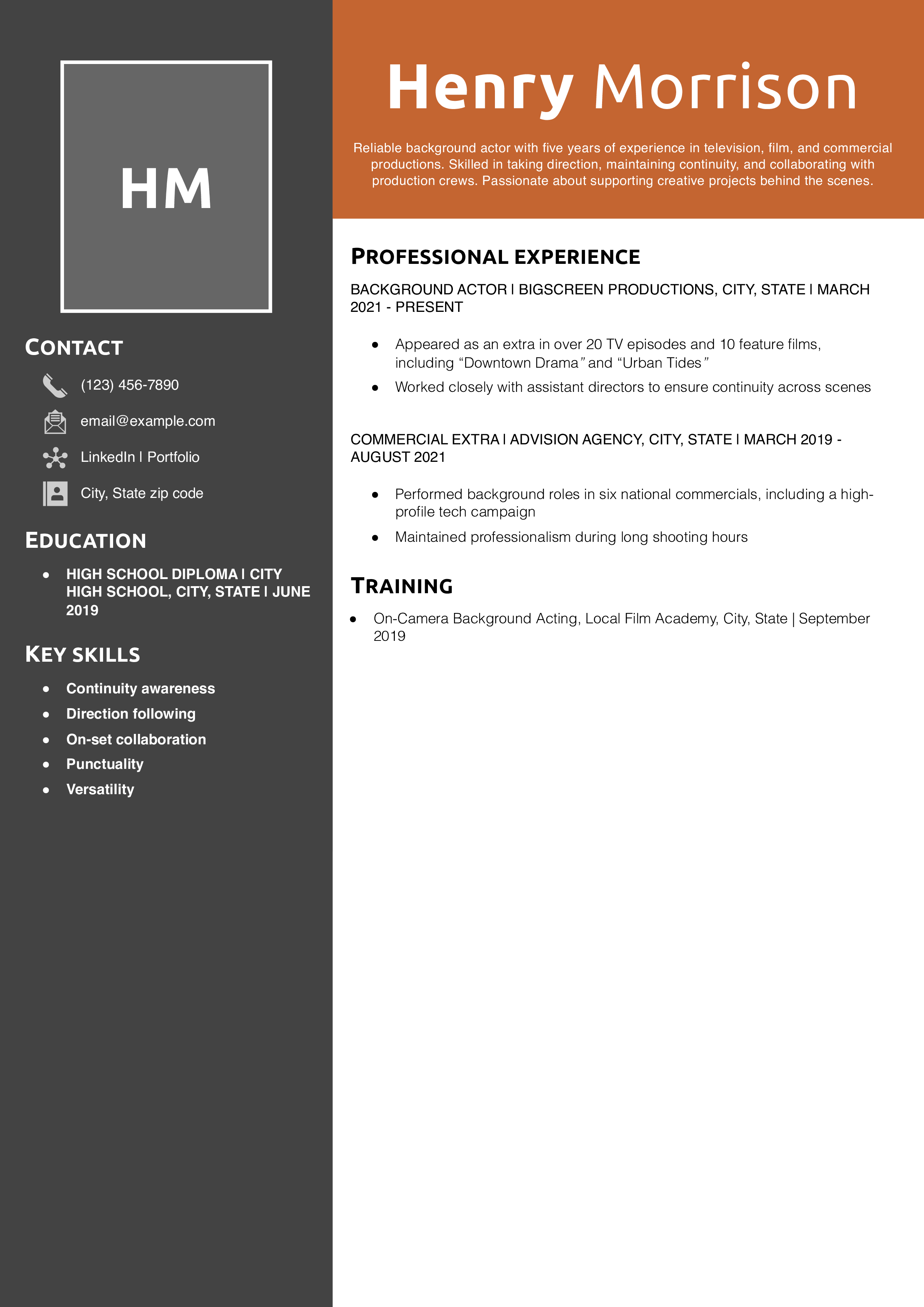
Why this Background Actor Resume is Strong:
This background actor resume emphasizes reliability and professionalism, which are essential in supporting roles. It highlights experience with continuity and collaboration on set. Learn more about how to feature skills on your resume here.
Professional Voiceover Acting Resume Example
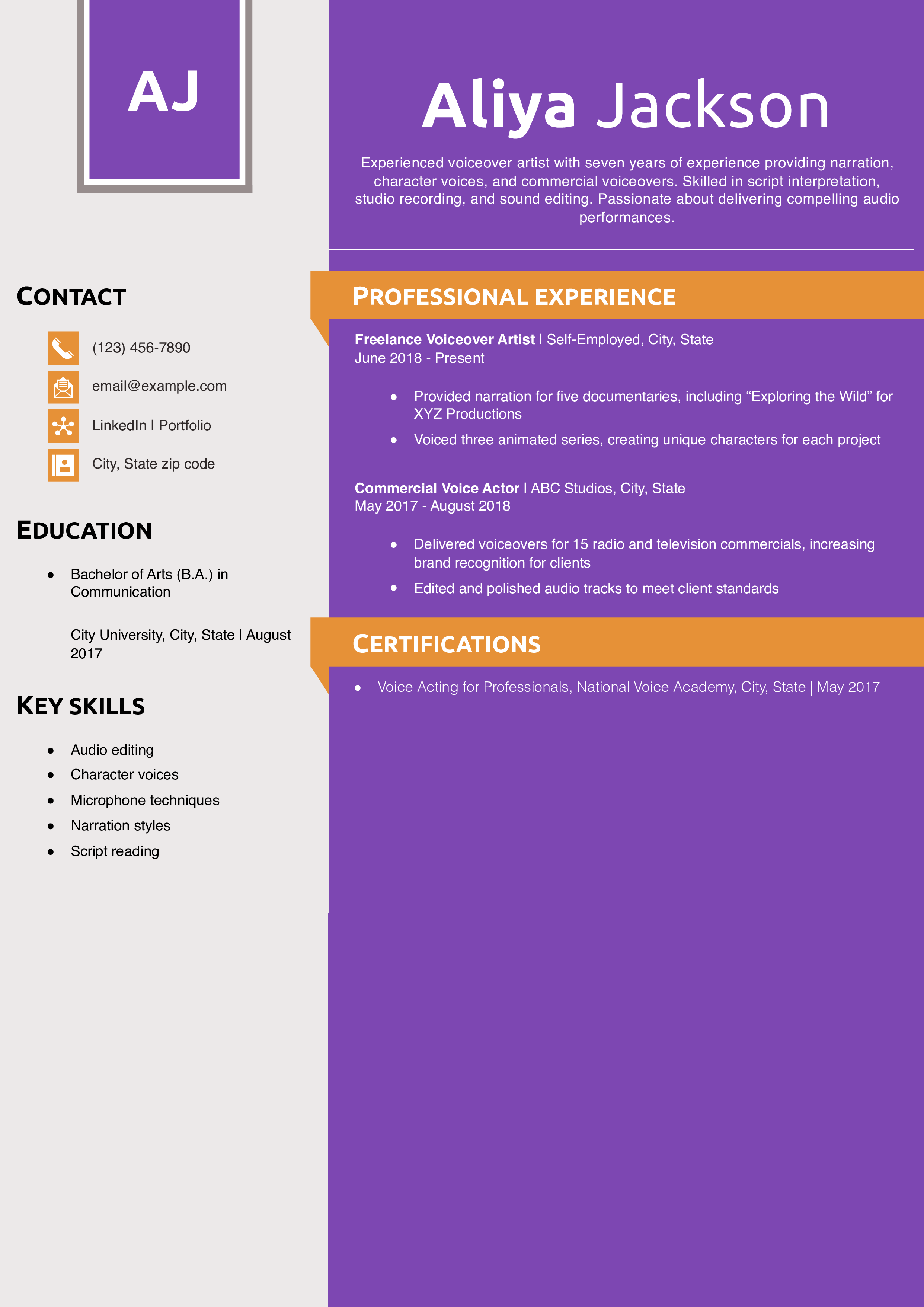
Why this Voiceover Acting Resume is Strong:
This voiceover acting resume showcases a range of narration and character work. Highlighting technical skills like audio editing adds depth to the candidate’s capabilities. Learn more about creating a powerful resume profile here.
Musical Theater Actor Resume Example
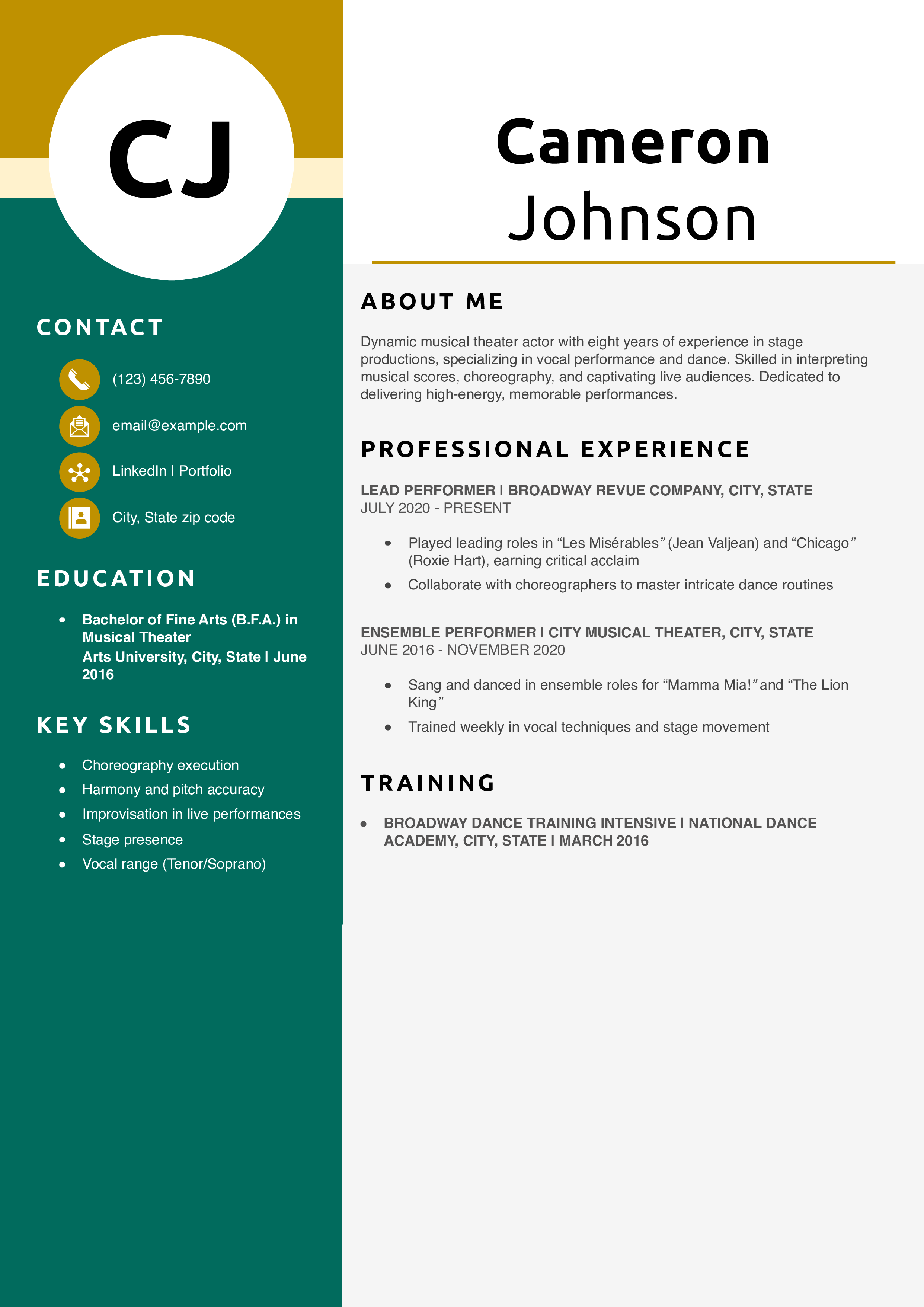
Why this Musical Theater Resume is Strong:
This musical theater acting resume highlights vocal range, choreography, and lead role achievements. It effectively demonstrates dedication to both musical and dramatic aspects of the craft. Learn more about highlighting your professional experience here.
Animation Voice Actor Resume Example
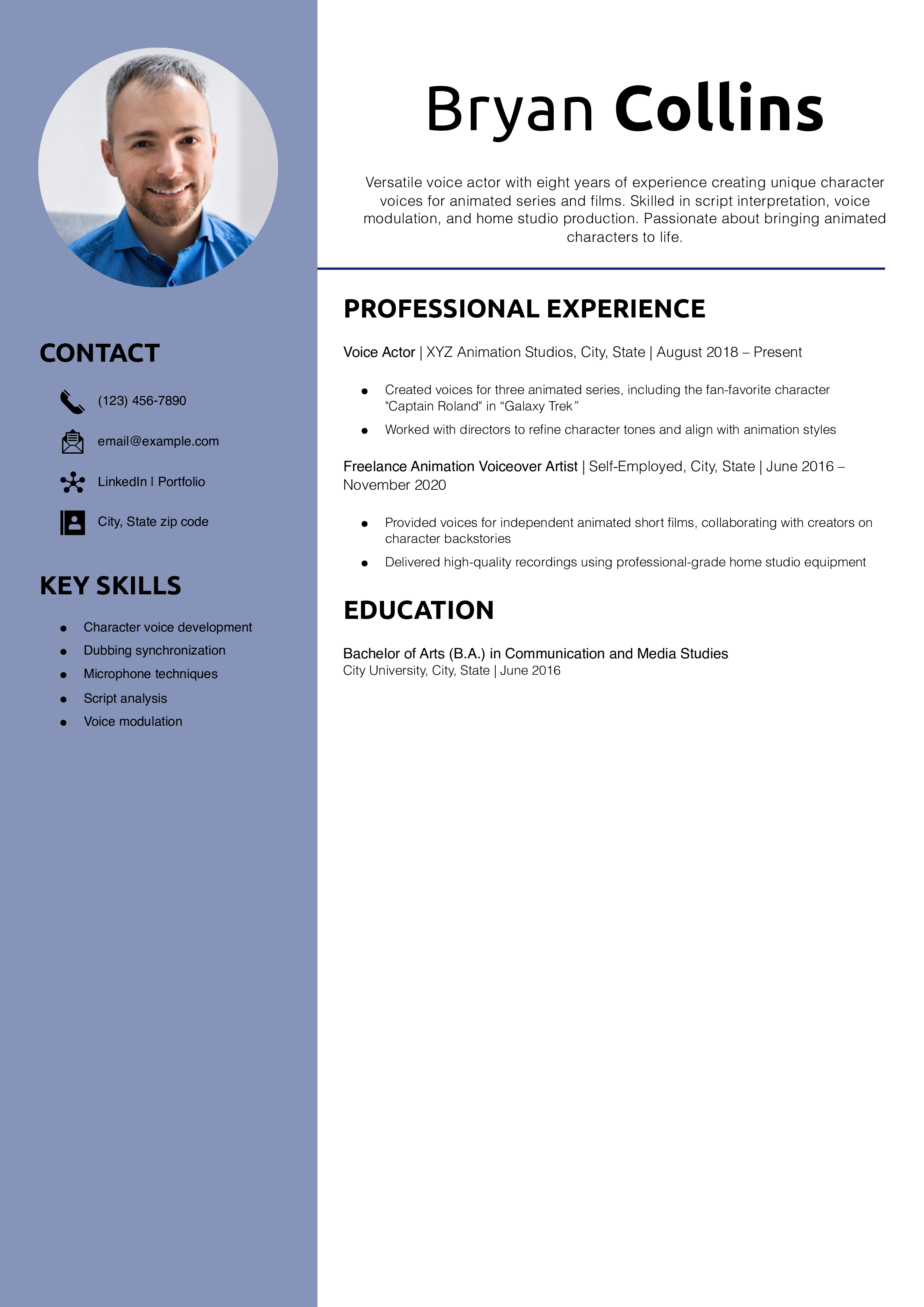
Why this Animation Voice Acting Resume is Strong:
This resume focuses on animation-specific voice acting skills and showcases recognizable roles. It highlights both professional studio work and independent projects. Learn how to build yours here.
Shakespearean Stage Actor Resume Example
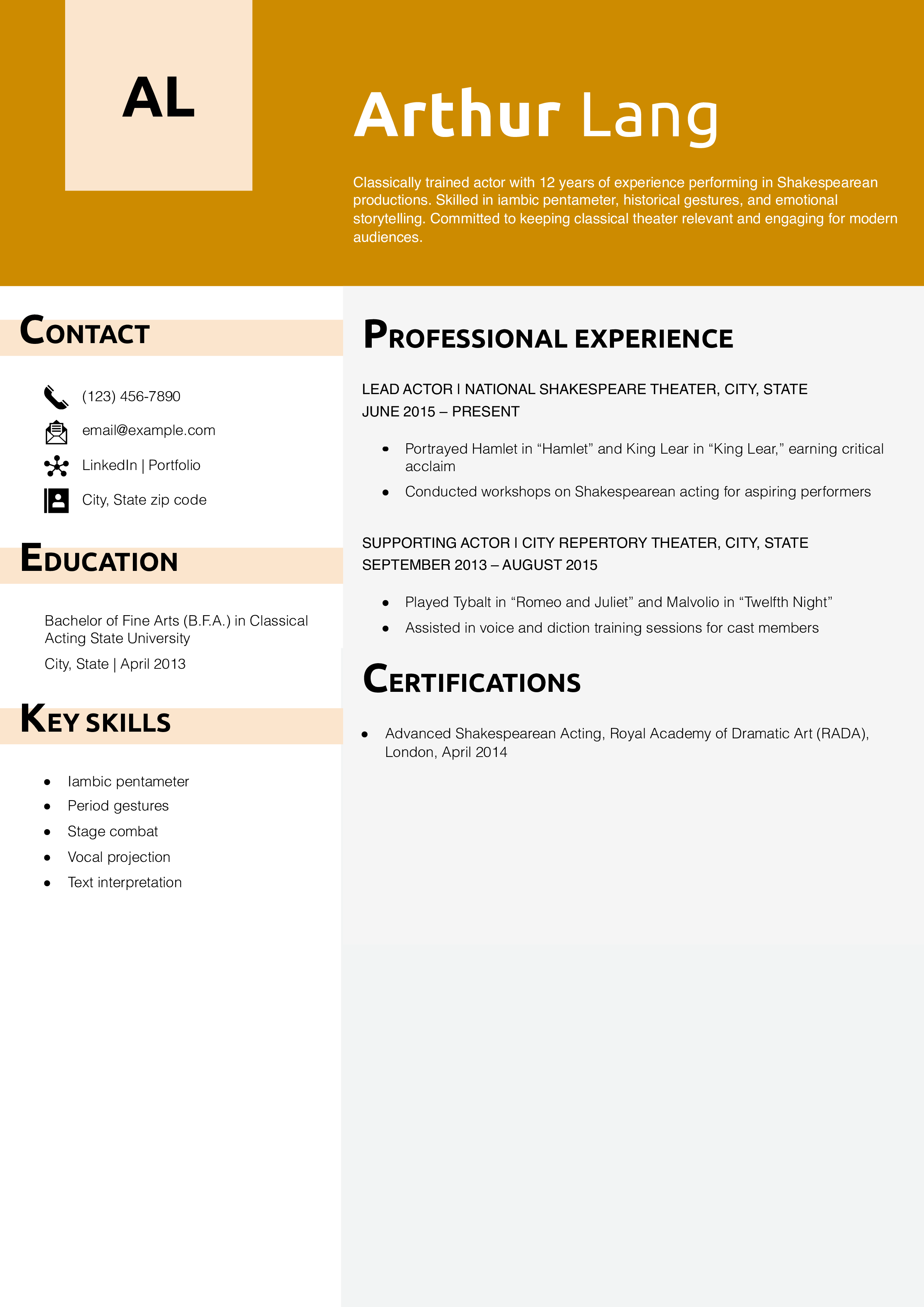
Why this Shakespearean Acting Resume is Strong:
This Shakespearean acting resume highlights classical training and major roles in renowned productions. It underscores expertise in period-specific techniques. Learn more about how to build a powerful resume here.
Independent Film Actor Resume Example
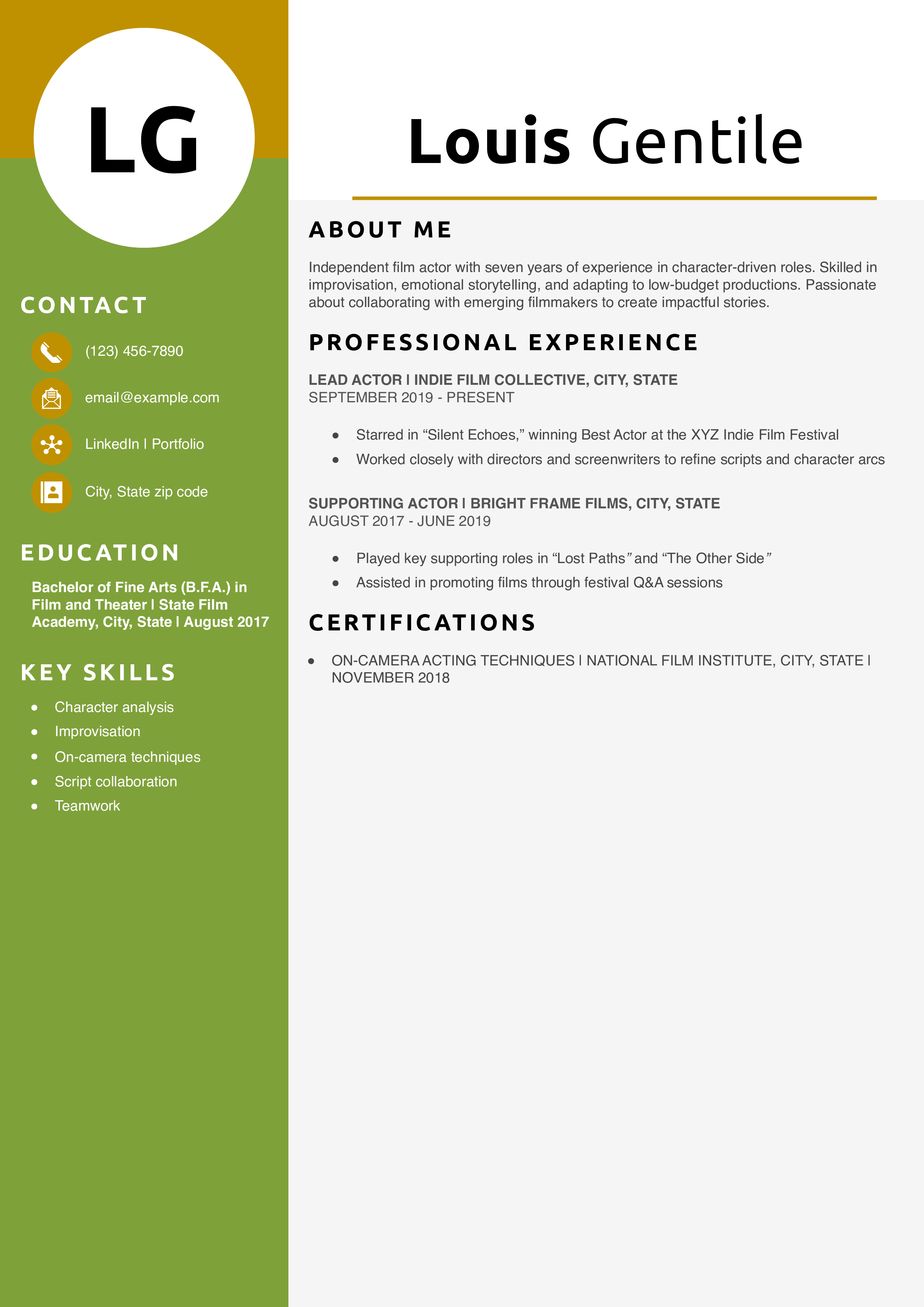
Why this Independent Actor Resume is Strong:
This independent film actor resume highlights collaboration and festival recognition, which are crucial in indie productions. It emphasizes flexibility and teamwork. Learn how to enhance yours here.
Stage Combat Actor Resume Example
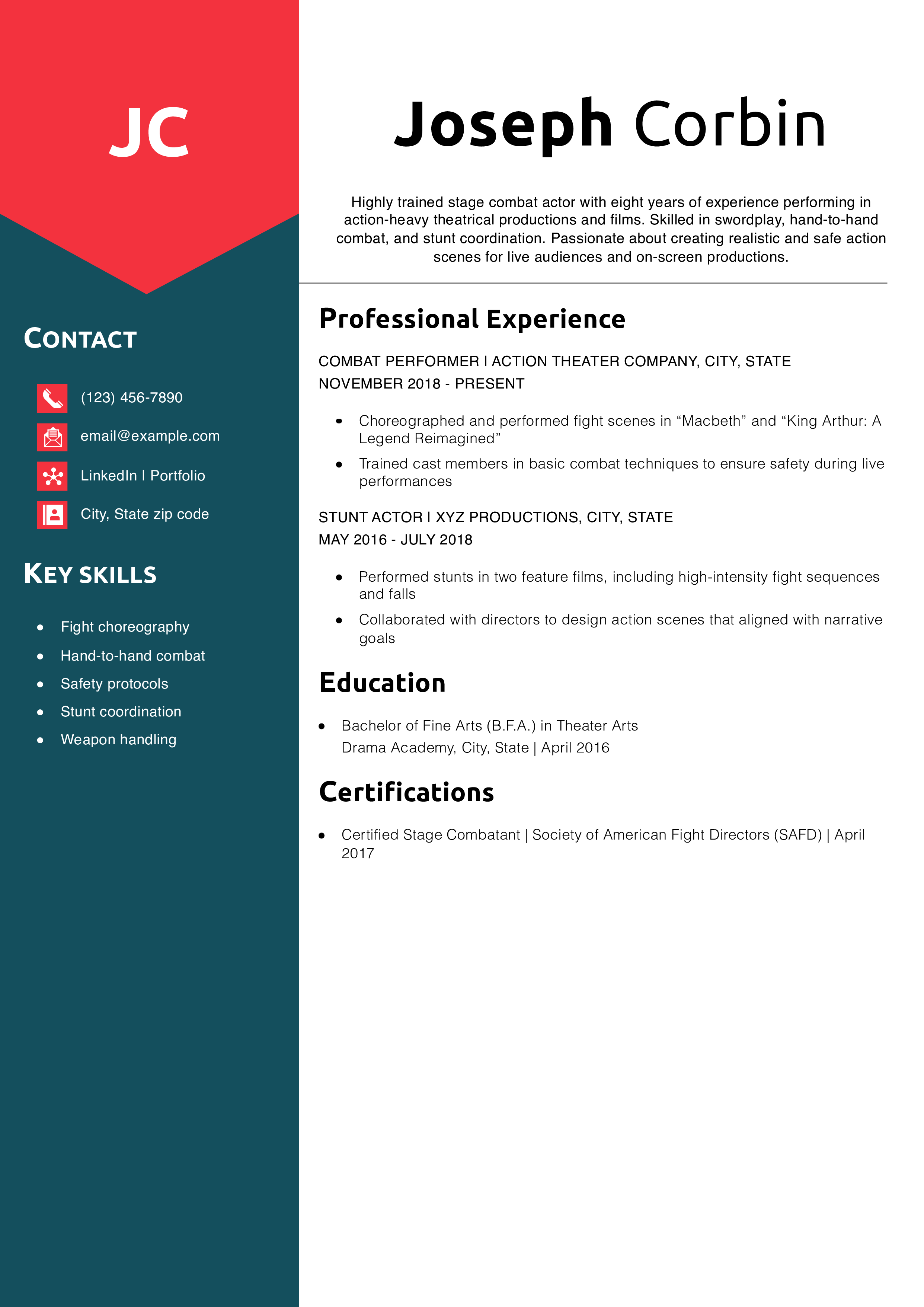
Why this Stage Actor Resume is Strong:
This stage combat actor resume emphasizes specialized skills and certifications, making it ideal for action-heavy roles. Highlighting safety protocols and teamwork demonstrates professionalism. Learn how to refine your document here.
Character Actor Resume Example
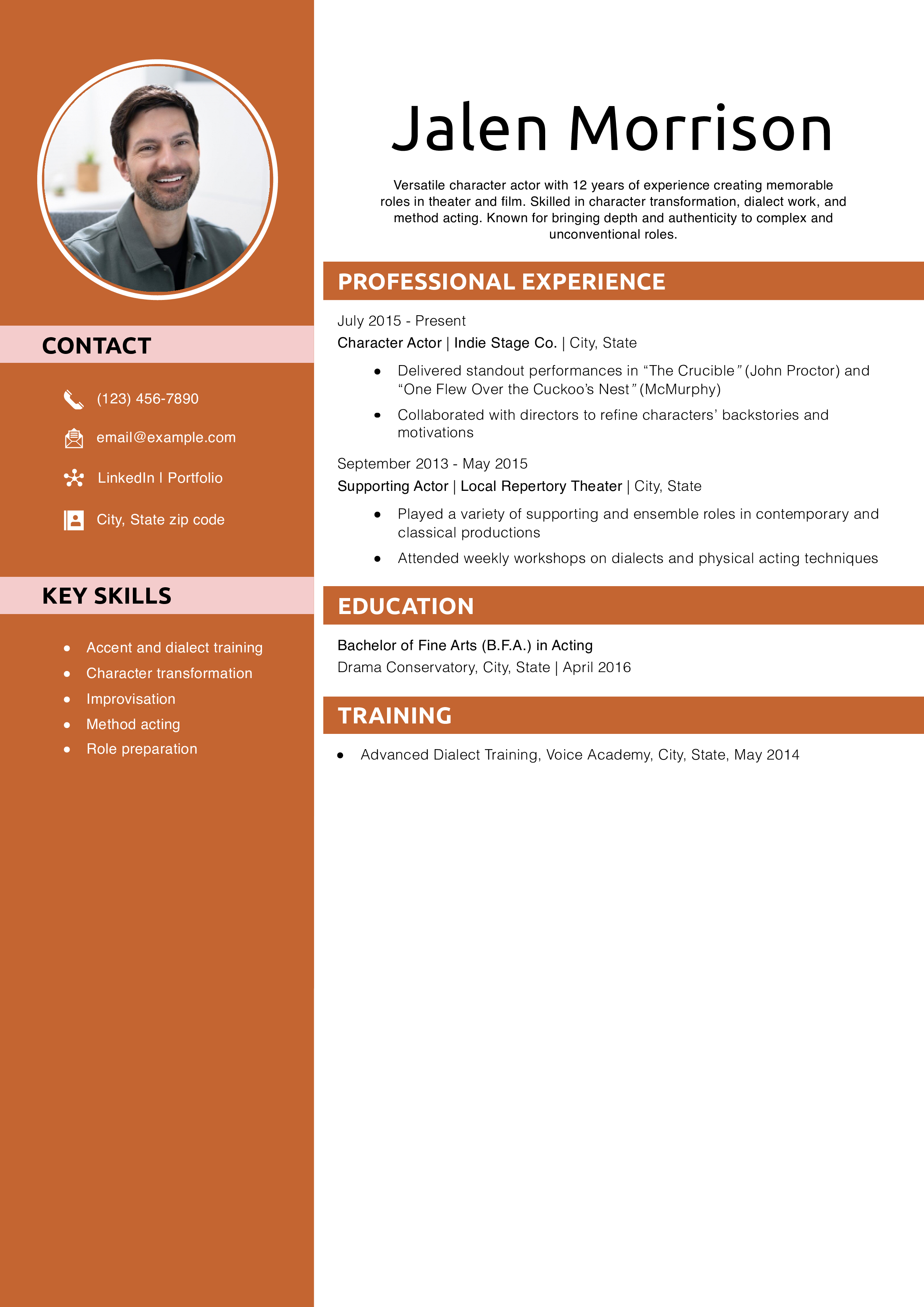
Why this Character Actor Resume is Strong:
This character actor resume highlights a strong focus on transformative roles and versatile techniques, making it ideal for dramatic and unconventional characters. Learn more about how to create an engaging resume summary here.
Theater Actor Resume Example
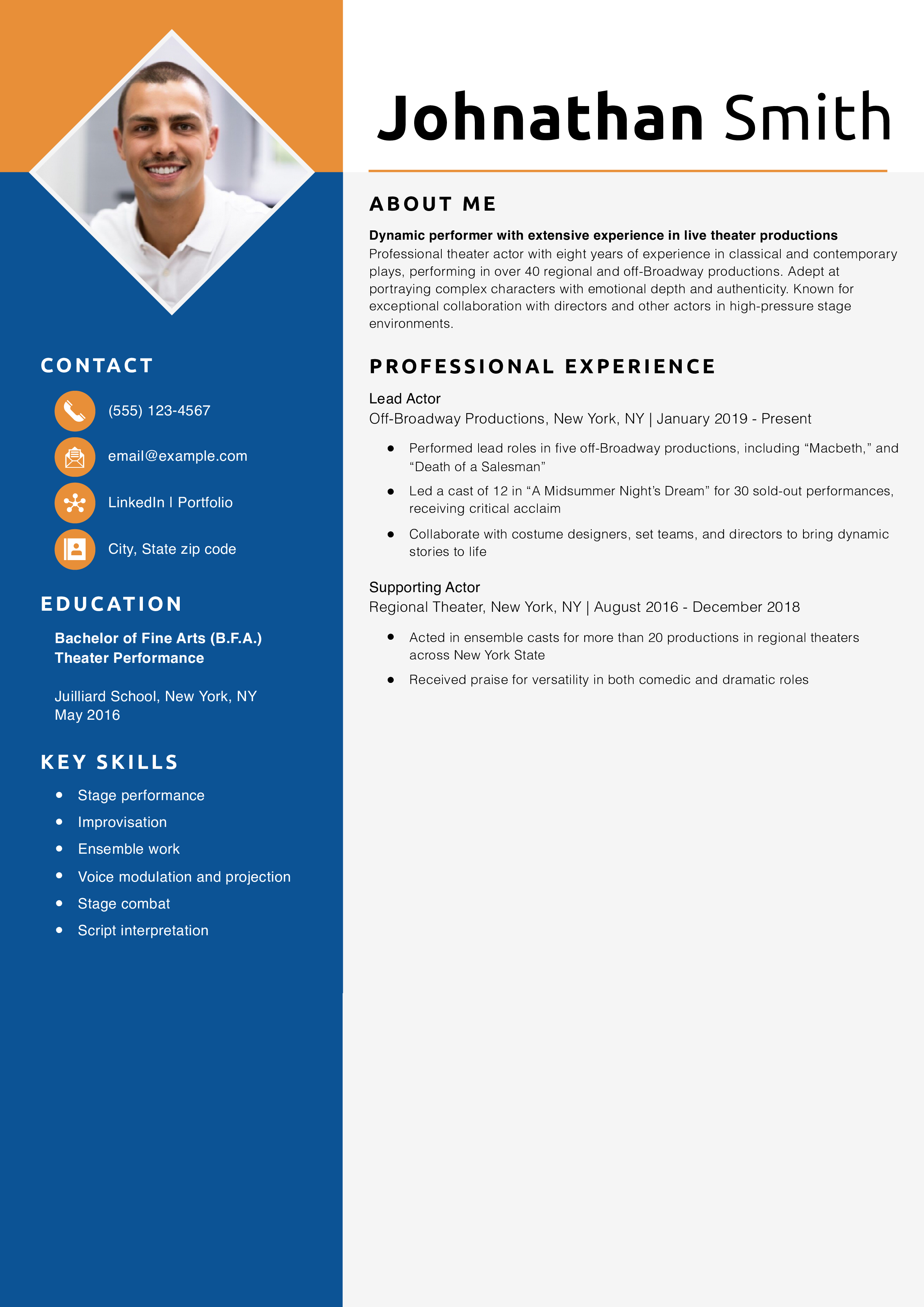
Why this theater resume example is strong:
This resume emphasizes the performer’s versatility in both classical and contemporary theater, while quantifying achievements like sold-out performances and critical acclaim. The profile and experience sections clearly highlight the actor’s range and ability to collaborate with technical and creative teams.
TV Actor Resume Example
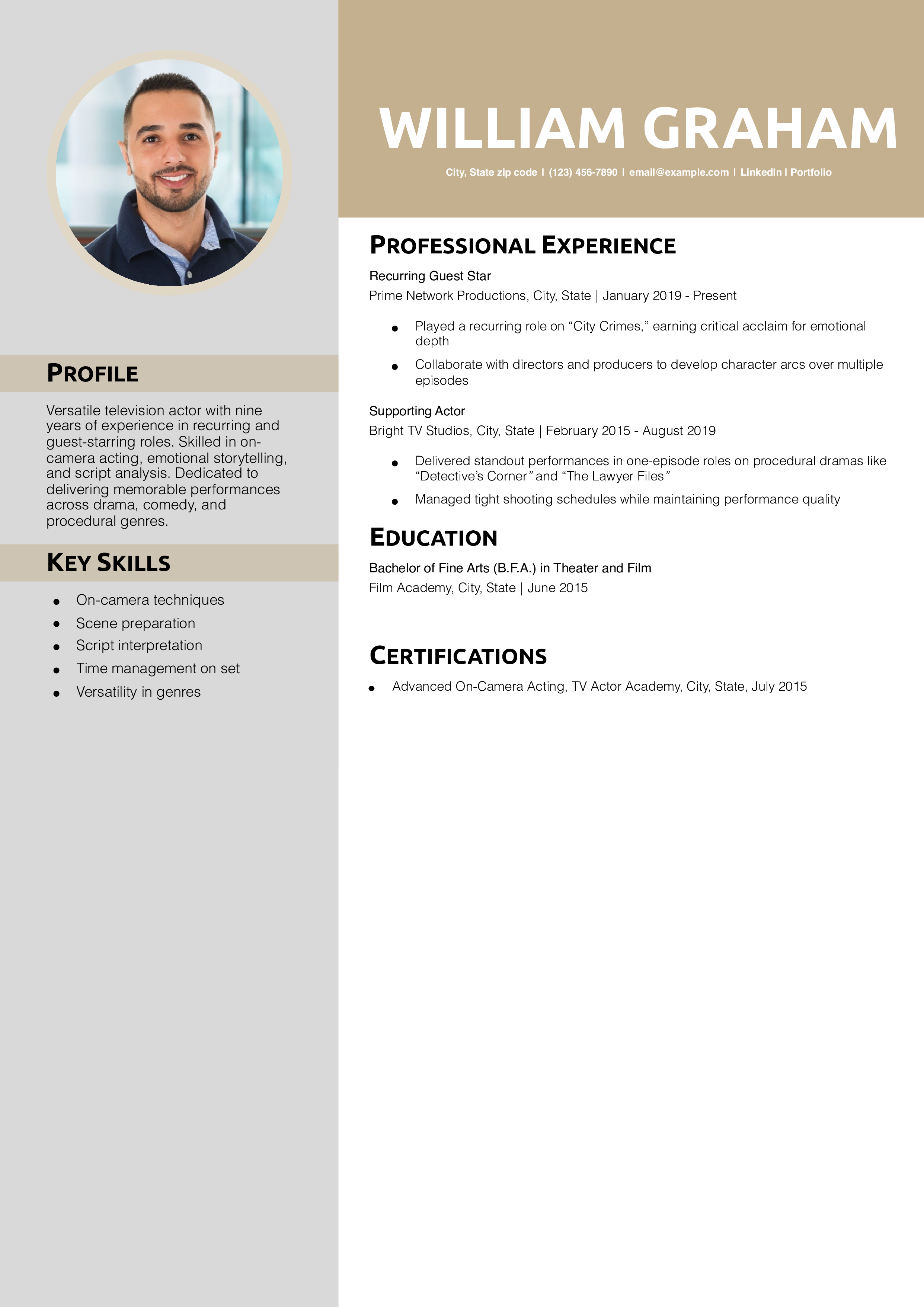
Why this TV Actor Resume is Strong:
This TV actor resume focuses on the skills and experience specific to television, such as recurring roles and emotional storytelling. It demonstrates adaptability to various genres. Learn how to refine your TV acting resume here.
Film Director/Actor Resume Example
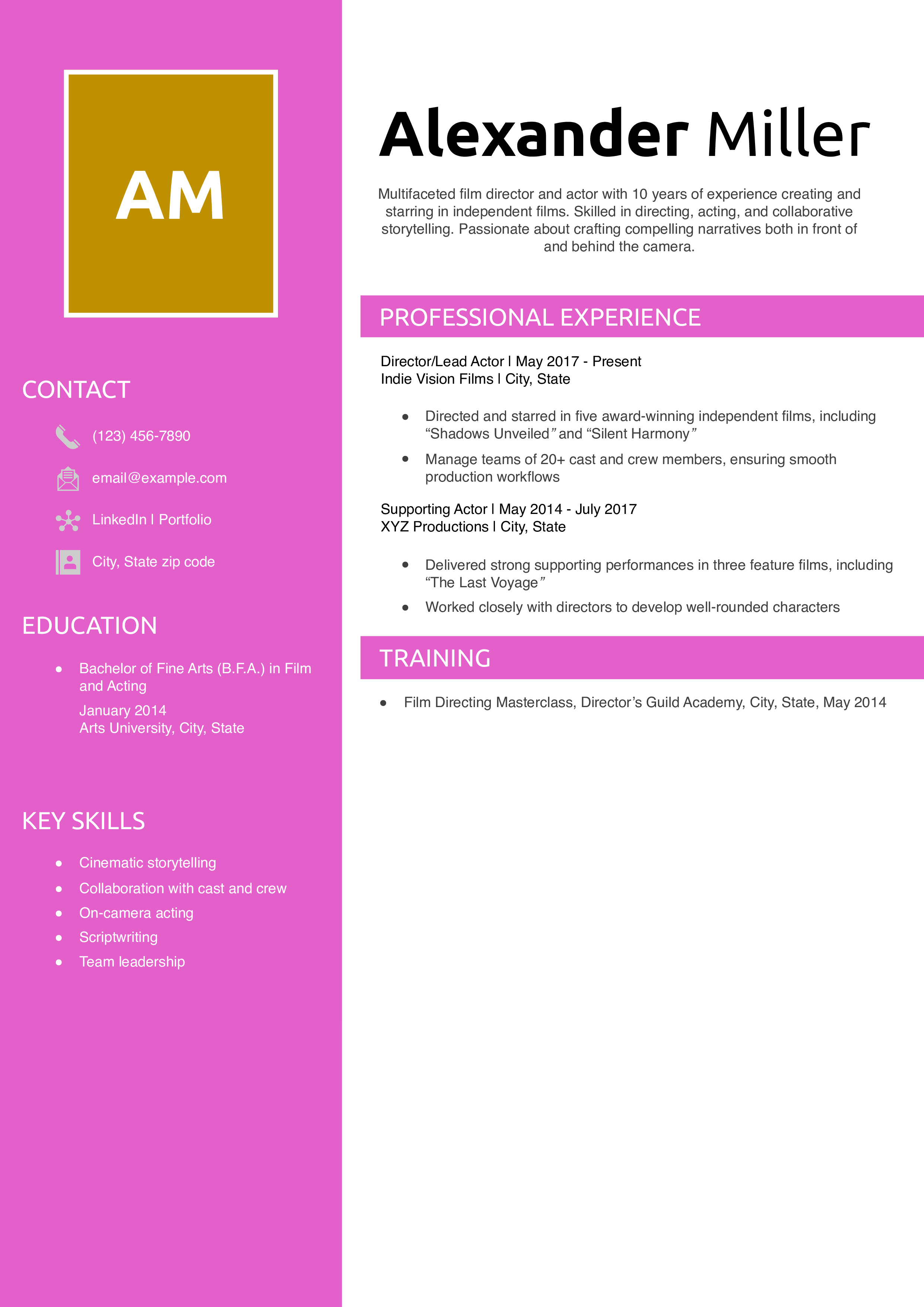
Why this Film Director/Actor Resume is Strong:
This resume effectively highlights dual expertise in acting and directing, demonstrating leadership and versatility. Specific film titles and awards strengthen its appeal. Learn more about highlighting your leadership capabilities here.
Acting Text-Only Resume Examples and Templates
How To Write an Acting Resume Example
A strong acting resume will clearly demonstrate the depth of your abilities and your past success on stage or on screen. To do this well, your resume should include these sections:
- Contact information
- Profile
- Key skills
- Professional experience
- Education, memberships, and awards
1. Share your contact information
Your resume should clearly display all contact information so the hiring team can reach you for a callback. List your full name, phone number, email address, location, and online profiles or portfolios.
Example
Your Name
(123) 456-7890
[email protected]
City, State Abbreviation Zip Code
LinkedIn | Portfolio
2. Craft a solid profile with a summary of your acting qualifications
Give the casting team a sneak preview of your resume with a brief summary of your acting experience and skills. Consider what directors are looking for and how you match the requirements of the role. Then, work this information into your profile, writing two to three sentences about your unique qualifications.
Mention your years in the industry and any special talents or awards. If you’ve performed internationally, describe that here. Or, perhaps you specialize in stunt work and physical acting — include this in your profile. A few compelling details will hook the reader and show how you’re uniquely qualified for the role.
Senior-Level Profile Example
Distinguished, award-winning actress with nearly 15 years in the industry and a PhD in theater and performance. Member of the National Association of Black Actors who excels in roles that demand deep emotional engagement and complex character arcs. Mentors aspiring actors and advocates for broader representation both on screen and behind the scenes.
Entry-Level Profile Example
Versatile actor who has performed in both television and theatrical productions over the last three years. Received the Young Artist Award for a leading role in “Dear Evan Hansen.” Adapts to classical or contemporary acting styles. Passionate about creating memorable performances. Working toward a bachelor’s degree in drama and theater at the University of California, Irvine.
3. Showcase your acting experience
This section will look slightly different than what comes standard in a basic resume template. Rather than provide a classic job description with bullet points of duties and accomplishments, you’ll create a three-column list outlining notable performances in chronological order. First, provide the production name, then the name of the part you played, and finally, the company name and year(s) performed.
If you’ve had roles in a combination of film, television, and theater productions, don’t combine them into one list. Instead, create separate sections for each category. This makes it easy for hiring managers to see how much experience you’ve had in different mediums.
Professional Experience Example
TV
Film
Resume writer’s tip: Tailor your resume for each application
Every role you play or audition for is unique. Before submitting an application, tailor your resume to meet the specific needs of that role. This should be done for every opportunity you pursue. Just as you would modify your dialect or accent for a character, adjust the language of your resume. This will help get you past ATS programs and into the hands of casting directors.
Using keywords throughout your resume is one great way to do this. Identify key skills, experiences, and qualities mentioned in the casting call. Let’s say you’re applying for a part, and the ad mentions “strong stage presence” and “physical comedy.” Use these words and phrases as you describe your own relevant experiences.
What if you don’t have experience?
Casting directors are used to seeing fresh talent without much on their resume, so start by working with what you have. If you majored in drama or participated in acting workshops, drama clubs, and improv groups, highlight this in your education section.
Even if you’ve been part of small plays or dance recitals as a kid, you can include those — any productions on stage or in front of a camera count. Also, focus on relevant skills you have, such as accents, languages, singing, or dancing.
4. Outline your acting-related education, memberships, and awards
Acting gigs may not require any formal education or special credentials the way other professions do. However, it’s still important to list your academic background, especially if you have performance training. Acting classes, workshops, drama school, and theater programs are all educational experiences you can include.
If you happen to have any memberships in unions or acting associations, mention it on your resume. This shows you’re actively involved in the community and serious about your work. Create a simple bulleted list with organization names and the years you joined.
Remember to include an additional section for awards to showcase the recognition you’ve received for your acting contributions. List the award title, issuing organization, and year earned.
Education
Template:
[Degree Name]
[School Name], [City, State Abbreviation] | [Graduation Year]
Example:
Bachelor of Fine Arts (B.F.A.) in Theatre
New York University, New York, NY | June 2018
Memberships
Template:
[Title], [Organization], [Year Joined]
Examples:
Member, Actors’ Equity Association, 2019
Member, The Dramatists Guild of America, 2018
Awards
Template:
[Award Name] – [Production Name], [Awarding Organization], [Year Received]
Example:
Outstanding Featured Actress in a Musical – “The Phantom of the Opera,” Drama Desk, 2019
5. Outline your most useful acting skills and proficiencies
The skills section of your resume should highlight exactly what directors are looking for. Study your casting call before creating your resume to identify any required skills for the role. Then, match them up with your own abilities and include them in a key skills section. This will likely be a mix of hard and soft skills like those listed below.
| Key Skills and Proficiencies | |
|---|---|
| Acting techniques (Stanislavski, Meisner, Method) | Adaptability |
| Collaboration | Confidence |
| Diction and accents | Emotional intelligence |
| Improvisation | Makeup and costume |
| Movement and body language | Resilience |
| Script analysis | Singing |
| Stage combat | Time management |
| Vocal training | Vulnerability |
How To Pick the Best Acting Resume Template
The best template for an acting resume is simple and clean. While it may be tempting to pick a flashy design, the priority for your resume should be readability. Casting directors quickly scan through applications and should be able to effortlessly identify the most important information. Choose a modern template with sophisticated fonts, minimalistic design elements, and a touch of color.
Frequently Asked Questions: Acting Resume Examples and Advice
To stand out from other applicants vying for the expected 9,000 yearly acting opportunities, your resume must align with the job description. Start by identifying the expectations, requirements, and preferences of the production company.
Emphasize projects that showcase the skills or genres relevant to the audition. This proves you’re serious about the role and studied what the casting team is looking for. For example, suppose they need someone who can perform complex choreography. In that instance, you would highlight any training in dance and previous roles where dance was significant.
The reverse chronological format is the best choice for an acting resume. Your past performances take the spotlight and prove this isn’t your first casting call. Work history is the focal point of this format, while your skills and education play a supporting role.
If you have less experience or you’ve only been cast as an extra, a combination resume is a good alternative. Instead of featuring past roles on center stage, your skills and training come first.
Include a cover letter with your resume
To present the full picture of who you are as an actor, craft a cover letter for each role you apply for. A cover letter is like the curtain raiser for your application, setting the tone for your resume. It’s a short narrative highlighting your most compelling acting experiences. Seize the opportunity to tell your unique story and explain what makes you the ideal cast member for their production.
Check Out Related Examples
Resume Templates offers free, HR approved resume templates to help you create a professional resume in minutes. Choose from several template options and even pre-populate a resume from your profile.

